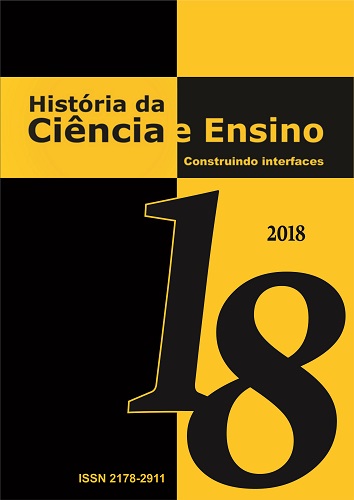A divulgação de Conhecimento Científico no final do século XVIII e início século XIX: Análise, Apontamentos, Reflexões
DOI:
https://doi.org/10.23925/2178-2911.2018v18p111-124Resumo
Resumo
Este texto faz uma reflexão acerca da importância sugerida pelos autores, tradutores e outros personagens responsáveis pela divulgação dos conhecimentos científicos do final do século XVIII ao início do século XIX no Brasil. Selecionamos, para nosso estudo, as seguintes obras: Elementos de Astronomia, 1813, Tratado Elementar de Machanica, 1812, Tratado de Optica, 1813, Tratado Elementar de Physica tomo II, 181 e o Jornal O Patriota, 1813-1814. O estudo apresenta as expectativas manifestadas pelos autores, tradutores e editores dos textos selecionados, no que se refere a importância social, política ou econômica, que davam aos seus trabalhos. Especificamente, centramos na identificação das manifestações dos autores dos textos entendendo que, além do ambiente social, político e econômico ao qual pertenciam, seus anseios, desejos e expectativas também fizeram parte das obras que constituíram. Dialogamos com autores como: Luís Miguel Carolino; Maria Odila Leite da Silva Dias e Lorelai Kury, constituindo um pano de fundo nessa empreitada. O estudo que realizamos permitiu considerar que não há uma resposta definitiva e que não podemos apontar que ambições ou expectativas os editores, autores ou tradutores exatamente tiveram para divulgar conhecimentos científicos. Porém, no que se refere a “utilidade” que atribuíam ao conhecimento divulgado, pudemos aprofundar um pouco mais e trazer algumas considerações que podem contribuir com análises e reflexões sobre a temática.
Palavras-chave: Conhecimento Científico; Utilidade; Divulgação de Conhecimento; História da Ciência.
Abstract
This text reflects on the importance suggested by authors, translators and other persons responsible for the dissemination of scientific knowledge, from the late eighteenth and early nineteenth century in Brazil. We selected the following texts to support our study: Elementos de Astronomia, 1813, Tratado Elementar de Machanica, 1812, Tratado de Optica, 1813, Tratado Elementar de Physica tomo II, 181 e o Jornal O Patriota, 1813-1814. The analysis presents some expectations expressed by the authors, translators and editors of these selected texts regarding the social, political or economic importance they gave to their work. Specifically, we focused on the identification of the manifestations of the authors of the texts, understanding that, in addition to the social, political and economic environment to which they belonged, their yearnings, desires and expectations were also part of the works they constituted. We dialogue with authors like: Luis Miguel Carolino; Maria Odila Leite da Silva Dias and Lorelai Kury, constituting a background in this endeavor. The study we conducted allowed us to consider that there is no definitive answer and that we cannot point out what ambitions or expectations the editors, authors or translators had exactly to disseminate scientific knowledge. However, with regard to the "usefulness" they attributed to the knowledge disseminated, we were able to deepen a little more and bring some considerations that can contribute with analyzes and reflections on the subject.
Keywords: Scientific knowledge; Usefulness; Knowledge Disclosure; History of Science

